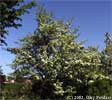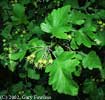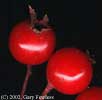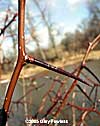
Trees of Wisconsin
|
Crataegus mollis (Torr. & A.Gray) Scheele downy hawthorn Family: Rosaceae |
||||||||||||||||||||
|
||||||||||||||||||||
|
There are about 40 species of Crataegus in Wisconsin, 17 of them are considered to be trees, and they are difficult to distinguish from one another. Crataegus mollis, shown here, is one of about 6-8 relatively common species. The stems usually have large thorns and the fruits look like little apples, or rose hips. The shape of the tree is similar to that of apple (Malus pumila), the bark of young branches is smooth and brown, and becomes gray and thoroughly divided into somewhat loose fragments on older trunks. The leaves can be variable in shape and size. The thorns make Hawthorn less palatable to large grazers. Some pastures,
and young woodlots which have originated under heavy grazing pressure,
can be dominated by Crataegus and other thorny species such as
Zanthoxylum americanum (prickly ash), because the other competing
species are eaten more readily. Most species of Crataegus appear
to prefer open sun or light shade and none seems to thrive under full
canopy in the long run, although they may persist in moderately shaded
sites for at least 10 years. The average first flowering date of Crataegus
mollis on UWGB has been May 15 over the last 16 years (range from
May 5 to May 30). |
|









